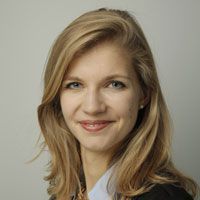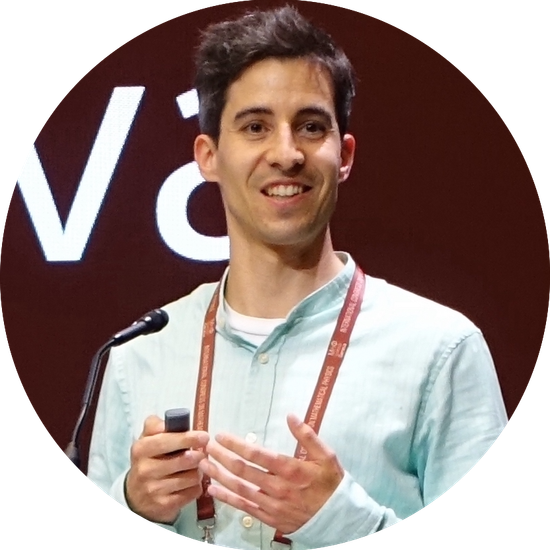An error occurred while loading the video player, or it takes a long time to initialize. You can try clearing your browser cache. Please try again later and contact the helpdesk if the problem persists.
Whether we stream our favorite series, develop new drugs or have us being chauffeured by a self-driving car -- machine learning is an essential part of our modern life, and of our future. But the growing amount of data and our increasing demands pose difficulties for today's classical computers. Can quantum computing overcome these challenges? What potentials does the emerging field of quantum machine learning have?
In this course, we will not only learn about quantum machine learning and its prospects, but we will also solve concrete tasks with both classical and quantum models. This course is aimed at students, experts and enthusiasts of quantum computing or machine learning. Prior knowledge about quantum computing or quantum information are strongly recommended.
Language: English
Deutsch, English
Advanced, Big Data and AI, Quantum Computing
Course information
Machine Learning has revolutionized our lives: image classification, natural language processing, drug discovery, weather forecasting, predictive maintenance, etc. The list of applications grows continuously. All of these models rely on the availability of powerful computers. In fact, over the past decades the computational resources of one chip have doubled every year. Currently, however, we are approaching the physical limitations of what classical computers can achieve. Yet our resource requirements keep increasing! Research institutes and industry are, thus, looking into alternative computing models such as quantum computing. With this emerging technology we may be able to push computational applications even further and tackle new challenges that are currently out of reach for existing classical processors.
As an interdisciplinary topic, this course is aimed at a broad audience. Students, experts, professionals and enthusiast from the fields of quantum computing, machine learning, physics and computer science are welcome to enroll!
In this course we will
- understand how to build both basic and advanced quantum machine learning models
- implement classical and quantum algorithms to solve machine learning tasks with Python and Qiskit
- learn about roadblocks and challenges of quantum machine learning
- explore the future prospects of quantum machine learning
Check out the course structure below for more information.
Quantum Computing Summer School:
Please note that this course has been reactivated as part of the Quantum Computing Summer School. You have the opportunity to complete the course independently with a certificate of achievement.
New deadline for submitting graded assignments: Tuesday, October 15, 2024, at 11:55 PM UTC.
Please note that in this course, there is only one graded assignment
Attention: This course is currently in self-study mode, in which you do not have access to graded assignments/exams. Therefore, we can only issue you a certificate of participation.
What you'll learn
- What is quantum machine learning?
- What are quantum machine learning algorithms?
- What are suitable applications of quantum machine learning?
- How can I implement quantum machine learning algorithms?
- What are potentials and bottlenecks of quantum machine learning?
Who this course is for
- Students
- Enthusiasts with quantum computing background
- machine learning experts
Course contents
Intro:
This course aims at enabling you to discover the field of Quantum Machine Learning. You will learn about the basics, such as parameterized quantum models and training algorithms, investigate promising models which are compatible with today's quantum hardware, and learn how to write Quantum Machine Learning algorithms by yourself with Qiskit.Week 1:
After giving an overview answering the question: "What is Quantum Machine Learning?", we will present a general introduction to machine learning followed by a deep-dive into Support Vector Machines and their quantum counter-part Quantum Support Vector Machines. Finally, we present a variational Quantum Machine Learning classification algorithm called the Variational Quantum Classifier.Week 2:
In the second week of the course, we will firstly discuss how Quantum Machine Learning models are being trained. Then, we have a closer look at two specific models, i.e., Quantum Generative Adversarial Networks and Quantum Boltzmann machines. Furthermore, we give a practical coding introduction to Machine Learning with Qiskit. Lastly, we explore the potential of Quantum Machine Learning in a discussion with an expert in the field.Final exam:
We hope you enjoyed this course on Quantum Machine Learning and wish you good luck for the final exam!I like, I wish
Enroll me for this course
Learners
Rating
This course was rated with 3.88 stars in average from 366 votes.
Certificate Requirements
- Gain a Record of Achievement by earning at least 50% of the maximum number of points from all graded assignments.
- Gain a Confirmation of Participation by completing at least 50% of the course material.
- Gain an Open Badge by completing the course.
Find out more in the certificate guidelines.
This course is offered by

Dr. Christa Zoufal is a Quantum Applications Researcher at IBM Quantum. She received her doctoral degree from ETH Zurich on her thesis about Generative Quantum Machine Learning. Her expertise combines knowledge about quantum information theory and computational methods. As part of the Quantum Finance & Optimization group her current research focuses on the exploitation of quantum computing within the context of quantum machine learning and optimization problems.

Julien Gacon is a Ph.D. candidate working jointly with the Quantum Technology group at IBM Research Europe — Zurich and the Computational Quantum Science Lab at EPFL, Lausanne. His current research focuses on closing the gap of quantum algorithms and near-term quantum devices on both the algorithmic and circuit level. Prior to this position, he worked on the open-source software Qiskit and continues developing core and applications packages during his research.
He received a B.Sc. and M.Sc. degree in Computational Science and Engineering from ETH Zurich. During his studies, he focused on numerical simulation techniques and specialized in Quantum Simulation and Computing, and Astrophysics.

Dr. David Sutter is a Research Staff Member of IBM Quantum at IBM Research — Zurich. He got his PhD in theoretical physics from ETH Zurich under the supervision of Prof. Renato Renner. David's research interests include theoretical aspects of quantum computing as well as quantum information theory.